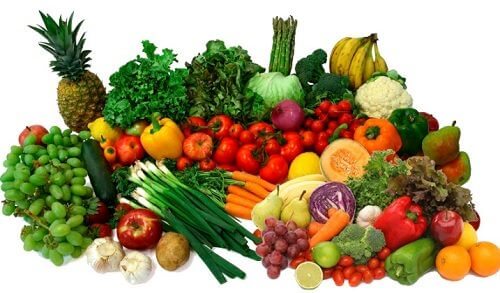6 Vitamins that Relieve Inflammation


Reviewed and approved by the doctor José Gerardo Rosciano Paganelli
Did you know that certain vitamins can help to relieve inflammation?
Inflammation is a reaction that is triggered by your body. It’s characterized by reddening, swelling, pain, and difficulty moving. It often appears as a consequence of the presence of the microorganisms, irritating substances, or because of an injury.
Let’s take a look at the vitamins that help relieve inflammation.
Vitamins that Help Relieve Inflammation
1. Vitamin A
Vitamin A is able to relieve pain in your muscles and joints. Also, it’s necessary for keeping your vision and skin healthy.
It also contributes to strengthening your immune system.
Vitamin A has also been shown that this nutrient regulates your inflammatory processes. It helps to reduce levels of the inflammatory mediator known as MCP-1.
How can you get the necessary amount of vitamin A?
Among the foods that have this vitamin, we find:
- Paprika
- Red pepper
- Sweet potato
- Carrots
- Lettuce
2. Vitamin E
Vitamin E is an organic compound that’s essential for good health.
Since your body can’t make it naturally, you need to add good amounts of it to your diet. It’s recommended that adults eat at least 15 milligrams of this nutrient every day.
According to a study carried out in 2008, eating vitamin reduces levels of cytokines. These are some of your body’s inflammatory mediators.
How can you get the right amount of vitamin E?
To get vitamin E naturally, you need to increase your consumption of:
- Nuts (walnuts, hazelnuts)
- Sunflower seeds
- Vegetable oils
- Vegetables (spinach, broccoli, tomato)
- Fruits (mango, kiwi)
It’s a good idea to include these foods when you’ve suffered from a cut or you can suffer from any kind of inflammation.
3. Vitamin C
Vitamin C relieves muscle and joint pain by protecting and healing your muscular tissues.
Also, it helps to:
- Strengthen your immune system
- Strengthen cellular development that helps with muscular maintenance and healing.
How can you get the amount of vitamin C you need?
The daily recommended value (DV) of vitamin C is one gram. You also need to add 500mg of flavonoids to this (natural antioxidants).
To get the flavonoids, it’s recommended you increase your consumption of:
- Vegetables (artichokes, spinach, broccoli)
- Fruit (apples, lemon, pomegranate, apricot, prunes)
- Green tea
- Cacao
According to several studies, a high intake of vitamin C reduces the amount of inflammation in your body. Vitamin C can be found in foods like:
- Oranges
- Peppers
- Kiwi
- Thyme
- Cauliflower
- Spicy peppers
- Guava
4. Vitamin B
The vitamins that belong to the B-complex vitamins regulate your metabolism and strengthen your immune system. They also reduce pain and inflammation in your muscles and joints. In addition, they’re essential for keeping your skin healthy.
B-complex vitamins are in charge of keeping your muscle toned and reducing inflammation in your joints.
This is very useful in chronic diseases like arthritis.
It’s recommended to consume at least 50 mg of B-complex vitamins during the day. This should be divided into two servings.
Among the foods that have these nutrients, we find:
- Eggs
- Lean meats
- Liver
- Peanut butter
- Walnuts
- Soybeans
5. Vitamin D
Vitamin D is a natural, soluble steroid. It’s made by your body after being exposed to sunlight. So, people exposed to a normal amount of sunlight per day don’t need extra supplements.
However, those who don’t get enough sunlight need to take a Vitamin D supplement.
Vitamin D is also useful for to relieve inflammation.
Also, besides sunlight, vitamin D can be received by eating:
- Fish
- Oysters
- Ham
- Tofu
- Dairy
6. Vitamin K
Vitamin K also helps relieve inflammation. It does this by inhibiting the inflammatory agents created by white blood cells, called monocytes.
In elevated levels, vitamin K helps you to improve your heart and bone health.
Vitamin K is especially present in these vegetables:
- Spinach
- Turnip leaves
- Swiss chard
- Parsley
- Roman lettuce
- Broccoli
- Cauliflower
Read: Foods that Cause Abdominal Swelling
Get Enough Vitamins to Relieve Inflammation
In order to relieve inflammation, it’s important to follow a balanced diet. This is the best way to give your body the nutrients it needs to stay healthy.
Also, as you can see, fighting inflammation can be rather nice and easy. This is because there is a large list of options. Try to include all kinds of foods in each meal.
At the same time, we recommend that you live a healthy lifestyle so that inflammation doesn’t have the opportunity to happen in the first place. Don’t forget to exercise!
All cited sources were thoroughly reviewed by our team to ensure their quality, reliability, currency, and validity. The bibliography of this article was considered reliable and of academic or scientific accuracy.
-
Andrea Moura, F., Queiroz de Andrade, K., Celia Farias dos Santos, J., & Oliveira Fonseca Goulart, M. (2015). Lipoic acid: its antioxidant and anti-inflammatory role and clinical applications. Current topics in medicinal chemistry, 15(5), 458-483.
-
Gilaberte, Y., Aguilera, J., Carrascosa, J. M., Figueroa, F. L., de Gabriel, J. R., & Nagore, E. (2011). La vitamina D: evidencias y controversias. Actas dermo-sifiliográficas, 102(8), 572-588.
-
McLaren, D. S., & Frigg, M. (1999). Manual de ver y vivir sobre los trastornos por deficiencia de vitamina A (VADD). Organizacion Panamericana de la Salud.
-
Sánchez, M. A., Martínez, V. B., & Fillat, Á. C. (2015). Calidad de la anticoagulación con antagonistas de la vitamina K en España: prevalencia de mal control y factores asociados. Revista Española de Cardiología, 68(9), 761-768.
This text is provided for informational purposes only and does not replace consultation with a professional. If in doubt, consult your specialist.








